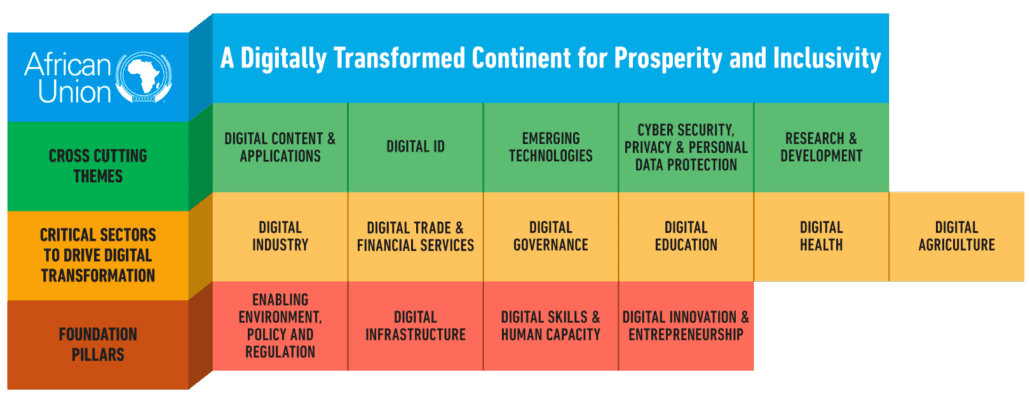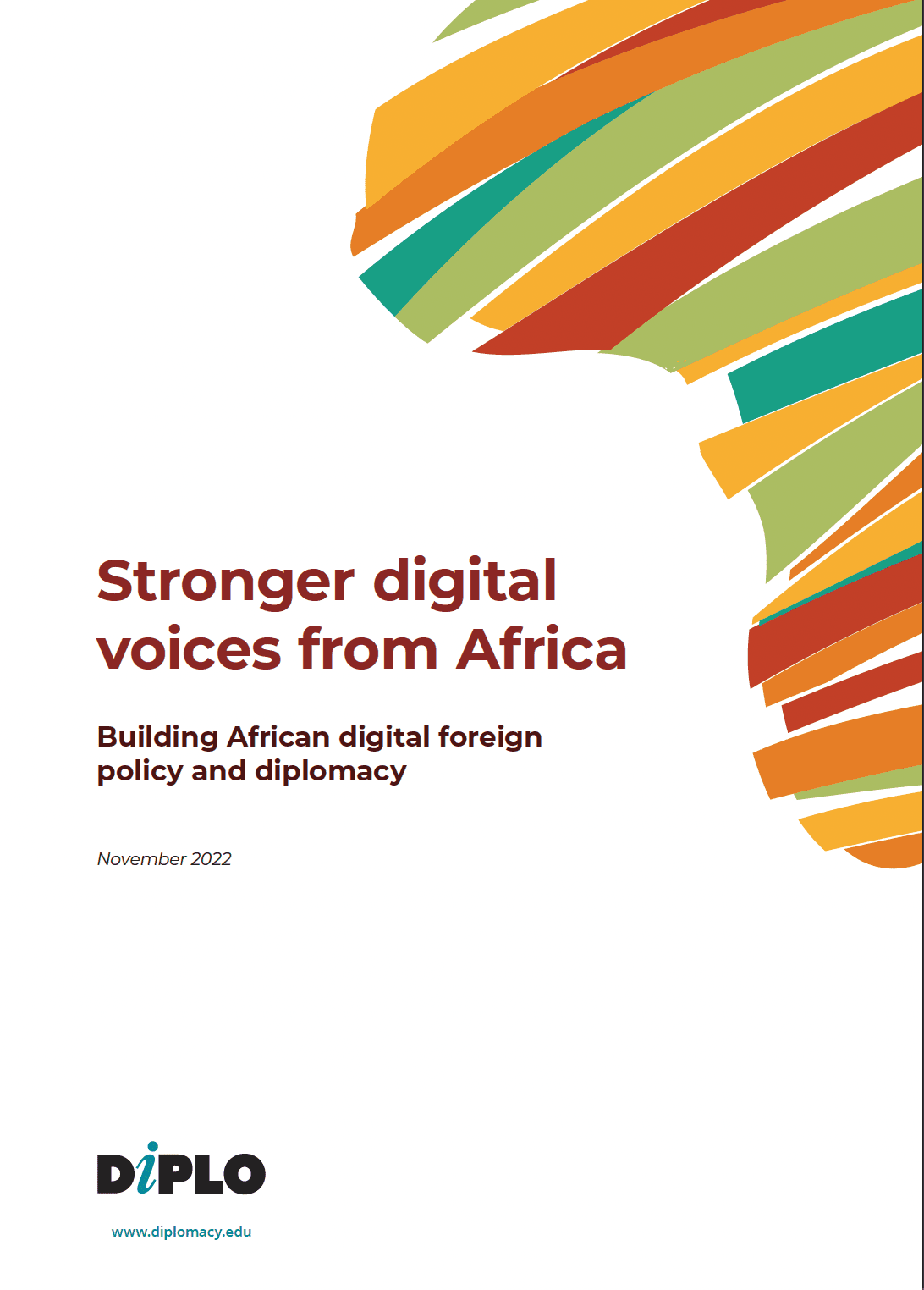Digital governance in African continental and regional organisations
Read full report Stronger digital voices from Africa: Building African digital foreign policy and diplomacy.
Setting the scene: Regional and continental cooperation
The idea of an integrated and united continent goes back to the Pan-Africanism of the nineteenth century. In the African Union‘s (AU’s) Agenda 2063, adopted in 2015, this takes shape in concrete aspirations and goals. The second aspiration of the agenda calls for ‘an integrated continent, politically united, based on the ideals of Pan-Africanism and the vision of Africa’s Renaissance’. This is more concretely spelled out in terms of working towards ‘free movement of people, capital, goods, and services’, a ‘continent of seamless borders’ and ‘significant increases in trade and investments amongst African states’. The realisation of these goals will depend to a substantial degree on digital tools and digital policies. Also noteworthy is the Agenda’s seventh aspiration, which envisions Africa as a strong and influential global player and partner, and emphasises the need for reinforcing participation in world affairs and multilateral institutions to enable the continent to ‘take its rightful place in the political, security, economic, and social systems of global governance’.1African Union [AU]. (2015). Agenda 2063. The Africa We Want. Popular Version.
Most digital issues cut across state boundaries and cannot effectively be addressed at the national level alone. The full benefits of the digital transformation can best be realised through policies that are coordinated across national jurisdictions. Both the AU and regional economic communities (RECs) (Figure 4) have a role to play in the coordination and harmonisation of policies.

The map shows countries by their membership to the eight RECs recognised by the AU: Arab Maghreb Union (UMA); Common Market for Eastern and Southern Africa (COMESA); Community of Sahel–Saharan States (CEN–SAD); East African Community (EAC); Economic Community of Central African States (ECCAS); Economic Community of West African States (ECOWAS); Intergovernmental Authority on Development (IGAD); and Southern African Development Community (SADC).
Recent initiatives in the area of digital governance and policy at the level of RECs and the AU point in the direction of increasing cooperation. There is diversity among African countries; this includes substantial cultural and legal diversity; diversity in terms of levels of digitalisation; and significant variations in legal, policy, and technological capacities. Tensions between countries are also inevitable, including on digital matters. Yet, there is also a clear sense that digital issues require multilateral – and multistakeholder – collaboration. And regional and continental approaches that work towards greater integration and harmonisation of digital policy issues have been growing. The African Continental Free Trade Area (AfCFTA) and its e-commerce provisions are just two such examples. On the one hand, collaboration is important to reap the benefits of digitalisation. On the other hand, greater coordination will also strengthen the position of African countries in negotiating with other actors and within key multilateral forums. In this sense, a digital foreign policy for the AU could become a reality in the future.
Throughout this chapter, we cover several key regional and continental strategies and initiatives that present elements of digital foreign policy or could form the basis of such regional/continental policies.
Digital priorities and elements of foreign policy
At the continental level, Agenda 2063 sets an overarching goal of achieving technological transformation and a well-developed ICT and digital economy across the continent by 2063. A strong digital economy will help Africa achieve other goals outlined in the strategy: become a major economic force in the world, and an active and equal participant in global affairs.
In 2020, the AU adopted an overall strategy to guide the continent’s digital transformation over the period 2020–2030: the Digital Transformation Strategy for Africa (DTS), which states that there is a ‘need for Africa to make digitally enabled socio-economic development a high priority’. It envisions ‘an integrated and inclusive digital society and economy in Africa that improves the quality of life of Africa’s citizens, strengthens the existing economic sector, enables its diversification and development, and ensures continental ownership with Africa as a producer and not only a consumer in the global economy’. Key themes are solidarity among African countries and African leadership in the process of digital transformation – a transformation ‘led and owned by Africa’s institutions’ and ‘embedded in Africa’s realities’.2African Union [AU]. (2020). The Digital Transformation Strategy for Africa (2020-2030).
The strategy – which builds on an intricate framework of topics (Figure 5) – highlights the importance of harmonising policies, legislation, and regulations and enabling ‘the coherence of existing and future digital policies and strategies at regional and national levels’. Focus areas include the following:
- Law and policy: to facilitate fair market regulation as well as broader human and people’s rights issues.
- Digital infrastructure: including mobile telephony, broadband infrastructure, terrestrial broadcasting data and cloud services.
- Human resources: including the issues of labour for the digital market as well as reskilling and upskilling various professionals required for the digital economy.
- Digital innovation and entrepreneurship: including creating an enabling environment regarding policies and policy harmonisation.

One of the Digital Transformation Strategy’s guiding principles is cooperation. It refers both to cooperation at the regional and continental levels (between the AU, RECs, and national institutions) and cooperation with international organisations. For instance, collaboration with development partners in the implementation of the strategy is envisioned as a key action line.
Other areas of action with international dimensions include cooperating with international organisations and donors (as well as public institutions, companies, universities, and NGOs) in the development of programmes focused on digital skills; incentivising international companies to hire and train young Africans ‘for local jobs or in the context of circular migration’; attracting international venture capital firms to invest in the African technology ecosystem; and promoting a wider participation of enterprises into international e-commerce.
Besides these two major AU strategies – Agenda 2063 and the Digital Transformation Strategy – elements of digital foreign policy can also be identified in the Declaration on Internet Governance and Development of Africa’s Digital Economy, issued by AU heads of state and government in 2018. The declaration outlines a series of principles that could be seen as representing a common African position on key internet governance issues:
- Promoting inclusive, transparent, and accessible internet governance.
- Maintaining an open internet based on open standards development processes.
- Facilitating a resilient, unique, universal, and interoperable internet that is accessible to all.
- Advancing multistakeholder approaches to internet governance that are open, participatory, inclusive, transparent, collaborative, consensus-driven, and respect cultural, gender, and linguistic diversity, and which seek to promote accountability and full participation of governments, the private sector, civil society, the technical community, and users.
Taking into account these principles, the heads of states and governments call on countries and regional and continental institutions to increase their participation in internet governance discussions and related public policy processes such as those taking place at the level of the Human Rights Council (HRC), the Internet Corporation for Assigned Names and Numbers (ICANN), the Internet Governance Forum (IGF), the International Telecommunication Union (ITU), and the UN. They are also requested to facilitate and contribute to national and regional IGFs, as well as encourage the participation of all stakeholders in such initiatives.3African Union Assembly of Heads of State and Government. (2018). Declaration 3(XXX) on Internet Governance and Development of Africa’s Digital Economy.
At a regional level, the various RECs have developed their own strategies, policies, and other initiatives related to ICT and digitalisation. These communities generally approach digitalisation from a market perspective and therefore emphasise market issues, such as enhancing trade and facilitating hubs. Facilitation of cross-border trade, as well as the harmonisation of laws, have been high on the RECs’ digital agendas. There has been less emphasis on broader political and social issues, for example, the human rights impacts of ICTs, gender mainstreaming, benefit sharing from the digital economy, and knowledge transfer.
Some of the policy documents issued by RECs include certain international dimensions. The Economic Community of West African States (ECOWAS),4ECOWAS member states: Benin, Burkina Faso, Cabo Verde, Côte d’Ivoire, Gambia, Ghana, Guinea, Guinea Bissau, Liberia, Mali, Niger, Nigeria, Senegal, Sierra Leone, and Togo. for instance, adopted an Act on Harmonization of Policies and the Regulatory Framework for the ICT Sector (2007), which encourages national authorities to ensure alignment of their policies with regional and international frameworks, as well as the coordination of their initiatives with relevant ones at the regional and global level.5Economic Community of West African States [ECOWAS]. (2007). Supplementary Act A/SA.1/01/07 on the harmonization of policies and of the regulatory framework for the information and communication technology (ICT) sector.
The Protocol on Transport, Communications and Meteorology agreed by the Southern African Development Community (SADC)6SADC member states: Angola, Botswana, Comoros, Democratic Republic of the Congo, Eswatini, Lesotho, Madagascar, Malawi, Mauritius, Mozambique, Namibia, Seychelles, South Africa, Tanzania, Zambia, and Zimbabwe. highlights the commitment of member states to develop national telecom networks and take advantage of international technological developments as part of broader efforts to advance economic development. It further calls on countries to participate in regional and international telecommunications forums (such as ITU) and outlines an agreement to coordinate national positions on ‘matters dealt with at all international telecommunications and other relevant fora’.7Southern African Development Community [SADC]. (1996). Protocol on Transport, Communications and Meteorology in the Southern African Development Community (SADC) Region. The e-SADC Strategic Framework (2010), dedicated to promoting ICT use for regional economic integration, has among its overarching strategies the promotion of participation in international ICT forums and the consolidation of SADC positions to present in such forums.8Southern African Development Community [SADC]. (2010). e-SADC Strategic Framework.
IGF initiatives and the whole-of-society approach
Within Africa, there is a continental IGF initiative – the AfIGF – which has been holding annual meetings since 2012 and is supported by the AU Commission (AUC) and the UN Economic Commission for Africa (UN ECA). In October 2022, there were 5 regional IGF initiatives9Central Africa IGF, East Africa IGF, North African IGF, Southern African IGF, and West African IGF. and 31 national IGF initiatives10Benin, Botswana, Burkina Faso, Cabo Verde, Cameroon, Chad, Côte d’Ivoire, Democratic Republic of the Congo, Gabon, Gambia, Ghana, Kenya, Liberia, Madagascar, Malawi, Mauritius, Mozambique, Namibia, Nigeria, Rwanda, Senegal, Sierra Leone, South Africa, South Sudan, Sudan, Tanzania, Togo, Tunisia, Uganda, Zambia, and Zimbabwe. across Africa recognised by the IGF Secretariat.11IGF Secretariat. (n.d.). National and regional IGF initiatives. All eight focus countries have a national IGF (Table 4).
IGFs are typically multistakeholder processes that foster dialogue and cooperation on digital policy issues of relevance at the national and regional levels. The fact that they bring together stakeholders from different groups can make them suitable venues to inform various policy processes. Governments and regional institutions could tap into the potential of IGFs to advance the whole-of-society approach to digital governance. They could run consultations – formal or informal – on their national digital policies or on the positions to take in international processes. And because discussions taking place at the national and regional IGFs usually feed into the global IGF, these initiatives could also act as promoters of national and regional interests, positions, and views. The challenge, however, is to ensure that these processes are truly multistakeholder and inclusive and that they have access to the resources needed to ensure their independence and sustainability.
Table 4. National IGF initiatives across the eight focus countries.
| National IGF initiative | Established in | Latest annual meeting (as of October 2022) |
| Côte d'Ivoire | 2020 | 2021 |
| Ghana | 2014 | 2022 |
| Kenya | 2008 | 2022 |
| Namibia | 2017 | 2021 |
| Nigeria | 2013 | 2022 |
| Rwanda | 2014 | 2021 |
| Senegal | 2017 | 2019 |
| South Africa | 2016 | 2022 |



